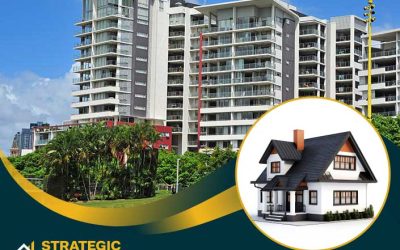
Decoding property management can lead to lucrative rental returns.
In this guide, we reveal essential strategies for maximizing your property’s potential through effective operations, tenant satisfaction, and robust financial management, leveraging the latest technology to excel in today’s market.
Key Takeaways
- Technological advancements such as property management software and data analytics have transformed traditional property management practices, streamlining operations and enabling data-driven decision-making.
- Effective property management hinges on crucial components like tenant retention strategies, preventative maintenance, and financial management, each playing a significant role in enhancing profitability and tenant satisfaction.
- Property management companies are pivoting to incorporate digital marketing, remote property monitoring, and transparent communication to meet the modern demands of property management and improve overall service delivery.
The Evolution of Property Management

Yet, the shift has not been entirely without challenges. The traditional practices, while foundational to property management, have shown limitations in managing complex operations and leveraging technological advancements. This has given rise to a perceived gap in fulfilling the evolving business needs for all-encompassing property management services. As a result, the industry has been in a constant state of evolution, adapting to the changing needs of property owners and tenants alike.
Traditional Property Management
Originating in the early 1900s, traditional property management has seen substantial development since its inception. These methods, characterized by the use of long-standing processes, focused on execution rather than innovation. Record-keeping, an essential aspect of property management, would often involve handwritten documentation and physical filing systems for investment properties. This manual approach, while practical in its time, proved to be increasingly inefficient as the industry expanded and the number of properties under management grew.
The limitations of these traditional practices became glaringly apparent in the face of increasing tenant expectations and the growing complexity of property management operations. This ushered in an era of change, with the industry recognizing the need to evolve beyond these traditional practices to meet the demands of the modern property owner and tenant.
Technological Advancements

- Data analytics
- Automated workflows
- Augmented reality
- 3D modeling
- Integration of smart home technologies
These advancements have not only streamlined property management but also enhanced operations and facilitated data-driven decision-making.
The significance of digital marketing in property management cannot be overstated. It expands reach, generates leads, and helps property managers establish a credible presence in the industry. Another innovative concept that has revolutionized property management is remote property monitoring. This technology provides the ability to supervise and manage single properties in real-time over the internet, reducing the need for physical presence and enabling immediate response to issues.
Key Components of Successful Property Management

The significance of these components lies in their interconnectedness. Effective tenant retention strategies can lead to lower vacancy rates and higher profitability. Meanwhile, preventative maintenance ensures the property’s infrastructure is preserved, guaranteeing tenant safety and enhancing property reputation. Financial management, on the other hand, promotes long-term financial stability and aids in the appreciation of property value over time.
Tenant Retention Strategies
Tenant retention is a key driver of profitability in property management. A high tenant retention rate results in stable rental income, reduced vacancy periods, and decreased turnover costs. Hence, the implementation of effective tenant retention strategies becomes crucial to the success of a property manager.
These strategies encompass a broad range of practices, from incentivizing lease renewals to maintaining open lines of communication and ensuring rental amenities are well-maintained. By decreasing vacancy rates and fostering a positive living environment, property managers can enhance tenant satisfaction and, in turn, increase their property’s profitability while efficiently collecting rent.
Preventative Maintenance
Likewise, preventative maintenance forms another vital part of successful property management. Regular property inspections and proactive maintenance can prevent costly repairs and maintain property value. These practices not only ensure the safety and satisfaction of tenants but also contribute to a positive property reputation.
A thorough property inspection involves evaluating:
- The age of the building
- Weather conditions
- Structural issues
- Plumbing and electrical systems
- HVAC systems
- Roof condition
- Exterior and interior condition
- Safety hazards
By proactively identifying and addressing these issues early on, property managers can establish maintenance strategies that ultimately lead to savings on expensive repairs and reduce the number of insurance claims.
Financial Management
Managing finances is an integral part of property management. It involves:
- Conducting a comprehensive forecast of rental income
- Tracking property upkeep expenditures
- Monitoring business costs
- Implementing effective rent collection strategies
- Monitoring property management expenses
These steps are key to successful financial management.
Effective financial management significantly influences the profitability of rental properties by promoting long-term financial stability, enhancing cash flows, and supporting informed financial planning and decision-making. Understanding and managing the financial aspects of property management can lead to increased tenant satisfaction, appreciation of property value, and a profitable return on investment.
The Role of a Property Management Company

The role of a property management company includes:
- Basic responsibilities such as rent collection, property maintenance, and tenant screening
- Resolving disputes between tenants or between tenants and landlords
- Managing the eviction process, if necessary
- Implementing effective marketing and advertising strategies to attract tenants
- Enhancing the efficiency of property management
- Ensuring the success of the properties they manage
Screening Tenants
Tenant screening is a key responsibility of a property management company. This process is crucial as it aids in identifying problem tenants, ensuring a suitable match between the tenant and the property, and reducing the risk of legal complications. Effective tenant screening involves conducting tenancy database checks, employment verification, and income suitability assessment.
The importance of tenant screening cannot be overstated. By ensuring properties are leased to ideal tenants, property management companies can improve tenant retention, reduce vacancy rates, and ultimately enhance the profitability of the properties they manage.
Legal Compliance
Legal compliance is another responsibility that falls on the shoulders of property management companies. They must ensure that the properties under their management adhere to all relevant laws and regulations. This includes compliance with fair housing laws, building codes, and health and safety regulations, among others.
They also have a role in dispute resolution and managing eviction processes. By acting as intermediaries and facilitating communication between landlords and tenants, property management companies can effectively resolve disputes and handle eviction processes, reducing legal complications for property owners.
Marketing and Advertising
Effective marketing and advertising are vital for the success of property management. Property management companies employ a range of strategies, including:
- Search engine optimization
- Content marketing
- Social media marketing
- Online advertising
- Email marketing
- Print advertising
These strategies help effectively market and advertise rental properties, ensuring each rental property reaches its target audience.
Online advertising has established itself as a cost-effective means to expand reach, engage with prospective clients, and generate leads. By understanding the competition and formulating effective strategies, property management companies can significantly enhance their marketing efforts and attract qualified tenants for their properties.
Selecting the Right Property Management Partner

A positive reputation and extensive experience can foster trust and confidence in clients, resulting in improved communication, proactive and responsive service, and the capacity to fulfill commitments. Further, personalized services that meet the specific needs of their clients and transparent communication can significantly enhance the relationship between property owners and the management company.
Experience and Reputation
When selecting a property management partner, the company’s experience and reputation are critical factors to consider. A company’s experience provides a comprehensive understanding of local regulations, market trends, and best practices, enabling effective management of challenges and maximization of returns for property owners.
The reputation of a property management company, on the other hand, can be assessed through references and reviews from landlords and tenants, customer satisfaction levels, and financial performance. Positive client feedback can provide valuable insights that can be utilized to enhance procedures, better address tenant requirements, and guide the company towards ongoing improvement and expansion.
Customized Services
Customized services are another important factor to consider when choosing a property management partner. Property management companies that offer personalized services tailored to meet the specific needs of their clients can greatly enhance the management of properties.
These services, which property managers offer, can range from all-inclusive fee structures, including management fees, to personalized home management plans designed specifically for investment properties and sole trader landlords. Our comprehensive property management service can enhance landlord-tenant relationships, boost tenant retention rates, and optimize rental income.
Transparent Communication
Transparent communication is a crucial aspect of a successful partnership with a property management company. It aids in:
- Issue identification
- Expectation alignment
- Misunderstanding prevention
- Trust establishment
- Positive relationship building
A deficiency in transparency in property management communication can result in:
- Overlooking critical issues
- Challenges in holding service providers accountable
- Misunderstandings and the establishment of unrealistic expectations between property managers and owners or tenants
Therefore, it is essential to evaluate the communication style of a property management company before engaging their services.
Leveraging Technology for Enhanced Property Management

- The collection and analysis of data to gain valuable insights into tenant behavior
- Enables remote property management
- Improves efficiency and tenant experience.
From property management software that streamlines processes to remote property monitoring that enhances property management and tenant satisfaction, technology has significantly transformed property management practices.
Property Management Software
Property management software serves as a robust tool that aids property managers in streamlining their workflows and enhancing their operations for single property or multiple properties. These solutions offer a range of functionalities, including:
- Rent collection
- Maintenance requests
- Lease agreements
- Tenant communication
By utilizing property management software, property managers can enhance operational efficiency, communication, and organization of property-related data.
The use of property management software can significantly enhance tenant communication and support automated rent collection. In addition, these solutions also aid in maintenance tracking, a crucial aspect of property management.
Digital Marketing Techniques
In the present digital era, the importance of online marketing strategies in successful property management cannot be discounted. Digital marketing techniques such as search engine optimization, content marketing, and targeted advertising can greatly enhance the visibility and reach of rental properties.
Search engine optimization plays a crucial role in property management marketing by improving online visibility for property listings and services, attracting a higher number of leads, and establishing trust and credibility with potential clients. Further, targeted advertising utilizes data and analytics to deliver customized ads to a specific demographic, particularly property owners and landlords, helping property managers effectively reach the right audience and attract qualified tenants for vacancies.
Remote Property Monitoring
Another technological breakthrough that has transformed property management is remote property monitoring. This technology enables the monitoring of activities, tracking, and real-time observation of unoccupied areas, offering convenience and cost-efficiency.
Security cameras and smart home devices play a crucial role in remote property monitoring. They enhance safety and security, offer peace of mind, and enable remote access to recorded or live video feeds for examination. By enabling property managers to:
- Oversee properties remotely
- Monitor for any suspicious activity
- Respond quickly to emergencies
- Keep an eye on maintenance and repairs
These technologies significantly enhance investment property management efficiency.
Summary
In conclusion, property management has significantly evolved over the years. From traditional practices to innovative strategies and the integration of technology, the landscape of property management is continuously changing. By focusing on key components such as tenant retention, effective maintenance, and sound financial management, and leveraging technology, property management companies can greatly enhance their efficiency and profitability. Choosing the right property management partner, with a wealth of experience, solid reputation, and the ability to offer customized services and maintain transparent communication, can significantly impact the success of property management endeavors.
Frequently Asked Questions

What does a property manager do Australia?
A property manager in Australia is responsible for the day-to-day management of properties, which includes finding tenants, collecting rent, handling maintenance and repairs, and dealing with legal matters that may arise.
What degree is best for property management?
A general business degree provides a good foundation and basic skill set for a property management career, as it covers accounting, finance, marketing, and business law.
Do you need a Licence to be a property manager in Australia?
Yes, licensing requirements for property managers in Australia vary by state and territory, so it’s essential to check the specific requirements for the area where you plan to work.
How much does property management cost in Australia?
Property management costs in Australia typically average around 7.5%, but can vary based on location and specific circumstances. In New South Wales, for example, the average ongoing fee is around 5.8%.
How has technology influenced the evolution of property management?
Technology has greatly impacted property management through the use of software for streamlined processes and remote monitoring for improved tenant satisfaction.













